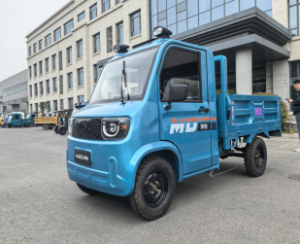I. مقدمه: وزن سبک به عنوان هسته تکامل EV
در وسایل نقلیه انرژی جدید (NEV) صنعت، محدوده تعادل، ایمنی و هزینه به چالش مهندسی کلیدی تبدیل شده است. افزایش مزایای سیستم درایو الکتریکی آلیاژ منیزیم آلومینیوم پیشرفت در ساختار سبک وزن و کارایی حرارتی را به ارمغان می آورد.
به عنوان یک پیشگام در تحرک الکتریکی جمع و جور، Tairui این انقلاب مواد را برای افزایش محدودیت های عملکرد و پایداری ادغام می کند.
دوم. چهار مزیت اصلی درایو های الکتریکی آلیاژ منیزیم آلومینیوم
2.1 وزن بسیار سبک: محدوده بالاتر، مصرف انرژی پایین تر
با تراکم تنها دو سوم آلومینیوم و یک چهارم فولاد، آلیاژهای منیزیم آلومینیوم وزن محفظه محرک الکتریکی را تا 30٪ کاهش می دهند.
تحقیقات نشان می دهد که هر کاهش ۱۰ درصد وزن بین ۶ تا ۸ درصد افزایش می یابد.
این سبک وزن EV طراحی می دهد میکرو EV های Tairui یک مزیت کارایی فوری، کاهش از دست دادن انرژی و بهبود شتاب.
2.2 افزایش قدرت، خنک کننده و عملکرد NVH
علیرغم سبک وزن، این آلیاژ به طور استثنایی قوی است - تا سه برابر مقاومت کششی آلومینیوم متعارف.
هدایت حرارتی برتر آن (تا 126 W / mK) به از بین بردن گرما موتور کمک می کند، در حالی که خواص طبیعی تخفیف NVH را بهبود می بخشد و رانندگی را صاف تر و آرام تر می کند.
برای تایرویاین مزایای سیستم درایو الکتریکی آلیاژ منیزیم آلومینیوم هم راحتی تصفیه شده و هم دقت مکانیکی را فراهم می کند.
2.3 تولید و کارایی هزینه
سیالیت عالی مواد از ریخته گری یک قطعه و تشکیل نیمه جامد پشتیبانی می کند، مراحل مونتاژ را کاهش می دهد و بازده را از 65٪ به 85٪ بهبود می بخشد.
با ثبات قیمت منیزیم و بلوغ زنجیره تامین، تخمین زده می شود که هزینه کل در مقایسه با سیستم های آلومینیومی 40 درصد کاهش یابد.
این نشان دهنده رهبری Tairui در نوآوری مواد خودرو و تولید مقیاس پذیر است.
2.4 سازگار با محیط زیست و سازگار با عملکرد
علاوه بر مزایای ساختاری، آلیاژهای منیزیم-آلومینیوم بسیار قابل بازیافت هستند و محافظت الکترومغناطیسی قوی را فراهم می کنند.
این کار عملکرد قابل اعتماد الکترونیک های داخلی را تضمین می کند که برای EV هوشمند سیستم هایی که سیگنال های پایدار ایمنی و اتوماسیون را هدایت می کنند.
III. چالش ها و محدودیت ها
3.1 مسائل خوردگی و طول عمر
این آلیاژ به راحتی با محیط های رطوبت و کلرید واکنش نشان می دهد و حفاظت از خوردگی را ضروری می کند.
تایروی استفاده از پوشش سطحی پیشرفته و غیرفعال سازی برای حفظ دوام بدون قربانی کردن مزایای سیستم درایو الکتریکی آلیاژ منیزیم آلومینیوم.
3.2 ثبات حرارتی و موانع فنی
گسترش حرارتی بالا می تواند بر ثبات ابعاد تحت گرما تأثیر بگذارد.
تولید نیاز به تجهیزات دقیق دارد که در حال حاضر توسط واردات تسلط دارد اما با تکامل فناوری داخلی، تایروی انتظار کاهش سریع هزینه و محلی سازی.
IV. مسیر استراتژیک Tairui: سبک وزن، هوشمند و پایدار
با ادغام سیستم درایو الکتریکی آلیاژ منیزیم آلومینیوم به مزایای آن EV های کم سرعتTairui در حال رانندگی آینده مهندسی وسایل نقلیه پایدار است.
طراحی پلتفرم سبک وزن آن کارایی بالاتر، بازیافت آسان تر و اکوسیستم های تحرک هوشمندتر را فراهم می کند که با اهداف خنثی کربن جهانی هماهنگ است.
V. نتیجه گیری
مزایای سیستم درایو الکتریکی آلیاژ منیزیم آلومینیوم یک گام مهم در نسل بعدی را نشان می دهد الکترونیکی طراحی
از طریق نوآوری مداوم و مهندسی سبک وزن، تایروی این فقط ساخت وسایل نقلیه نیست، بلکه آینده پایدار را شکل می دهد که در آن عملکرد با کارایی ملاقات می کند.

